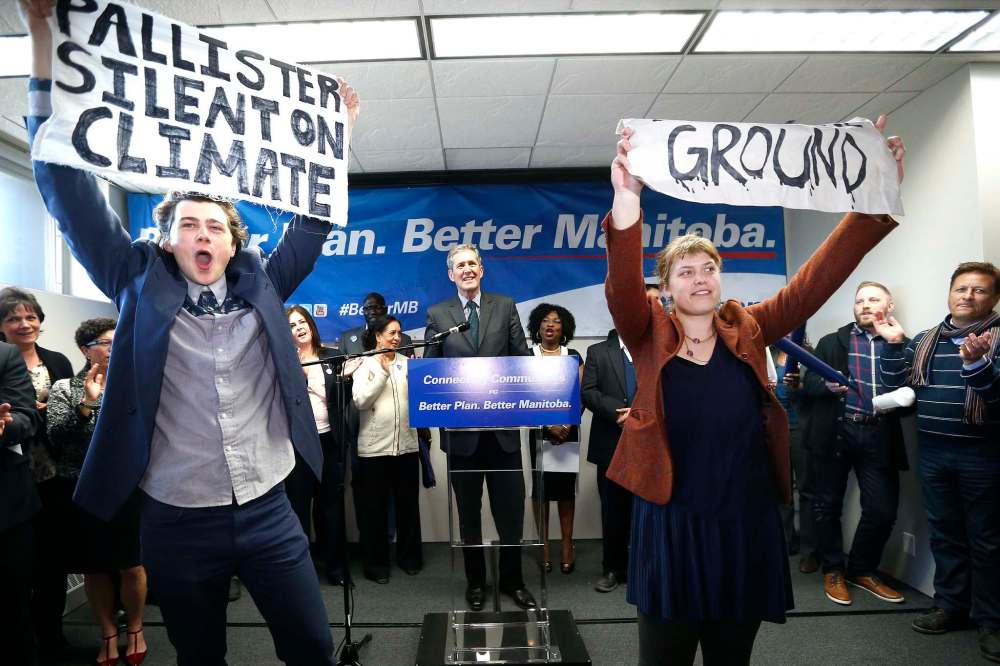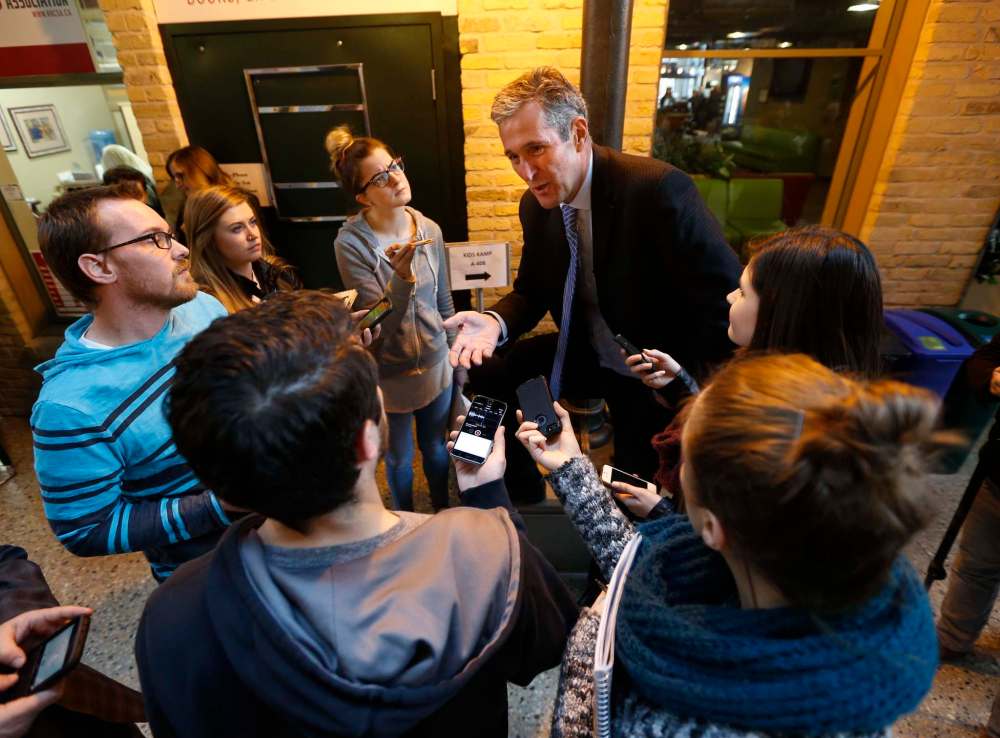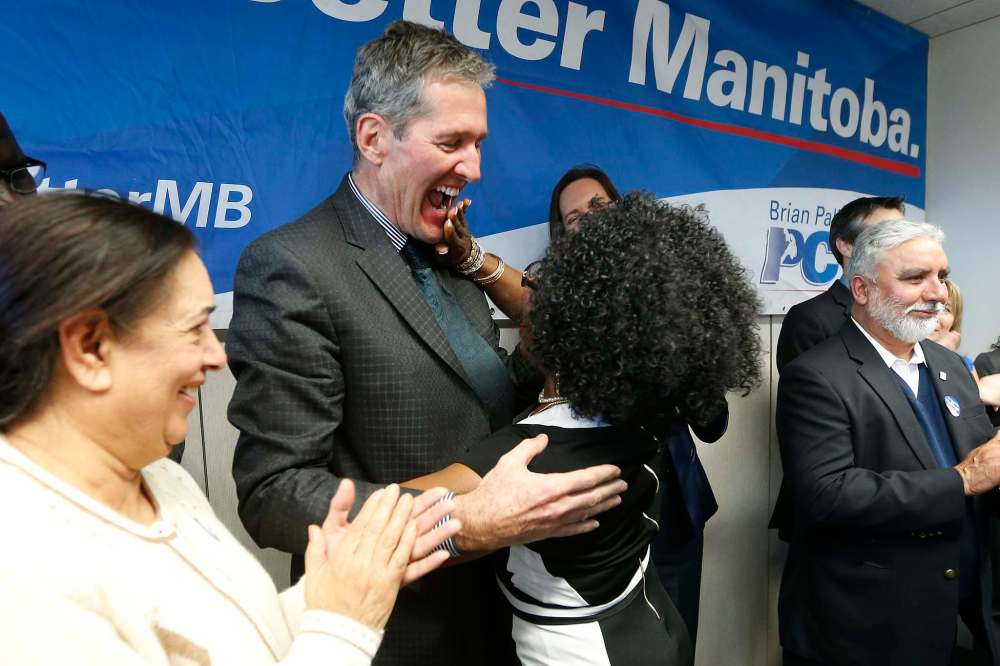The results man
Being likable low on Progressive Conservative leader's list of priorities
Advertisement
Read this article for free:
or
Already have an account? Log in here »
To continue reading, please subscribe:
Monthly Digital Subscription
$1 per week for 24 weeks*
- Enjoy unlimited reading on winnipegfreepress.com
- Read the E-Edition, our digital replica newspaper
- Access News Break, our award-winning app
- Play interactive puzzles
*Billed as $4.00 plus GST every four weeks. After 24 weeks, price increases to the regular rate of $19.95 plus GST every four weeks. Offer available to new and qualified returning subscribers only. Cancel any time.
Monthly Digital Subscription
$4.99/week*
- Enjoy unlimited reading on winnipegfreepress.com
- Read the E-Edition, our digital replica newspaper
- Access News Break, our award-winning app
- Play interactive puzzles
*Billed as $19.95 plus GST every four weeks. Cancel any time.
To continue reading, please subscribe:
Add Free Press access to your Brandon Sun subscription for only an additional
$1 for the first 4 weeks*
*Your next subscription payment will increase by $1.00 and you will be charged $16.99 plus GST for four weeks. After four weeks, your payment will increase to $23.99 plus GST every four weeks.
Read unlimited articles for free today:
or
Already have an account? Log in here »
Hey there, time traveller!
This article was published 13/04/2016 (3603 days ago), so information in it may no longer be current.
Among Winnipeg electoral districts where Progressive Conservatives go to die, Kildonan is one of the most formidable.
The New Democratic Party has held this provincial riding for all but two years since it took on its modern shape in 1981. And for the past 26 years, Kildonan has been represented in the Manitoba legislature by Dave Chomiak, one of the NDP’s most respected MLAs.
Yet less than two weeks before election day, the orange-hued north Winnipeg riding is where PC Leader Brian Pallister has chosen to spend a relatively leisurely lunch hour. The Tory leader is chatting with young Kildonan PC candidate Nic Curry and his supporters at the Salisbury House on Leila Avenue when a senior from St. Andrews walks up and extends her arms.

“I want to shake the hands of the next premier,” she says, uttering a line that could not have been scripted better had it been authored by Pallister public relations handler Olivia Billson.
If recent polls are accurate and popular opinion remains static over the next five days, the Tory leader is indeed poised to become Manitoba’s 22nd premier on Tuesday. But to avoid appearing arrogant about the prospects of most of Manitoba turning blue, the 61-year-old PC leader reverts to competitive-sports clichés befitting a former provincial curling champion, basketball player and fastball pitcher.
“The polls are an indicator, but everything can change. Politics can change. Most sports contests are settled in the last 10 per cent of the time allocated, so I never, ever lose touch with the reality that you do not jog to first base,” he says, sitting at a table in the Leila Sals, the back of his 6-8 frame nearly flush against a wall. “We’re not even at first base.”
This is the messaging you’d expect from a leader of a party that hasn’t tasted power in 17 years. Pallister has to motivate the troops, lest they let up and give Tory voters an excuse to stay home on election day, as many of them did on E-Day in 2011, when Pallister’s predecessor, Hugh McFadyen, failed to increase the party’s seat count.
Since Pallister took over the reins of the party in 2012, he has been expected to help them reclaim power. From the beginning, there were doubts about whether his personal style — confident and aggressive, practically to a fault — could be embraced by an electorate that often wants its leaders to be likable.
Even now, Pallister’s personal popularity lags behind that of his party. But the longtime politician insists competence is more important.
“To me, it’s never been about likability, right? I know that that’s the modern poli-sci concept — you’ve got to be a likable guy and stuff,” he says. “Likability doesn’t enter into my concept of what’s the most important thing. If you care for my children and you’re respectful and have integrity, then I’ll like you. But there’s a lot of people I like I wouldn’t put in charge of my children.
“In Manitoba, we’re in charge of a lot of people’s futures here: seniors, kids, families, you name it. I have tried consistently to do the right thing, and I’ve tried to explain it and be transparent about it, but I don’t make a great effort — I know I don’t — to be a likable person. Probably, I should do more of that. But I have friends who love me. I have a family who loves me.
“I didn’t get into this business because I needed adulation, I guess is what I’m saying. I got into this business because I thought maybe I could help, and I’ll build a team to help.”
Despite Pallister’s insistence, there are clear signs he’s tried to temper a personality described as abrasive and self-centred by friends and party colleagues who knew him as a Manitoba PC MLA in the 1990s and as a Tory MP in the last decade. In 2013, not long after assuming the role of Manitoba’s Opposition leader, he told Free Press feature writer Randy Turner his critics were probably right about the single-minded manner in which he used to pursue his aims.
Pallister has continued to moderate his behaviour. Two days before he made the rounds at Salisbury House, protesters opposed to the Energy East pipeline crashed a PC campaign rally. Instead of pulling a Stephen Harper and ushering them out, Pallister borrowed a page from Justin Trudeau and stood back.

Days later, when more protesters appeared at a campaign event at the Ma Mawi Wi Chi Itata Centre, he declined to show up, at first claiming he wanted to spare the non-profit organization’s staff the grief but later questioning whether he made the right decision.
At the same time, signs of the old, stubborn Brian Pallister remain. Asked at an Assiniboine Park Zoo campaign stop whether he would mend fences with gay, lesbian, bisexual and trans Manitobans by attending the Pride Winnipeg parade, he could only muster a limp offer to check his schedule and state he wasn’t averse to the idea. A more straightforward “yes” would have acted as a shield against attacks from the NDP, which proceeded to spend the next week painting Pallister as a homophobe because of his opposition to gay marriage in decades past.
Pallister is even more reluctant to address a more pressing charge levied against him and his party: that the Tories have been unusually vague about the costs they intend to cut in order to whittle down a Manitoba deficit now projected to be $773 million.
It did not help the PC leader when he resorted to the tropes of Reagan-era supply-side economics when asked about his plans for Child and Family Services, whose operating costs have skyrocketed due to growing demand.
“The economy has to work, or our social programs and all the proposals, all the expenditures in the world, won’t work,” Pallister said at a campaign stop at West Kildonan’s Tenderloin Meat & Sausage, making a very 1980s suggestion laissez-faire policies can alleviate social misery.
The following day, Pallister insisted he’s not a fan of trickle-down economics and turned the concept on its head by claiming that’s what the NDP espouses.
“Greg Selinger’s trickle-down. I’m trickle-up,” Pallister insists. “He’s saying give me extra money and higher taxes; I’ll spend it better than you, and I’ll build all kinds of things. What was it today? A ring road?”
Nonetheless, Pallister is the only leader to acknowledge that whoever winds up in charge of a province with a growing deficit and interest payments will have no choice but to make some form of cuts. The question is, how will Pallister trim the public service without becoming the villain depicted in the NDP’s attack ads?
“I think transparency is the answer, and I don’t think we’ve had a lot of that,” Pallister says. “There are decisions that may well have to be made that aren’t going to make everyone happy, but the surest way to fail is try to make everyone happy.
“The answers lie in prudent, thoughtful, foresighted and transparent management practices. They always have; we’ve just not seen that for a long time here in Manitoba.”

Spend time with Pallister, and he’ll offer a running commentary about southern Manitoba geography and history; he maintains an encyclopedic knowledge of the Portage la Prairie region, down to which family owned what plot of agricultural land and when.
He may also mention how he grew up poor, worked as a teachers union representative, fought for property rights for indigenous women and supported equal benefits for gay couples in the 1980s. He insists he got into politics to advocate for vulnerable people. He is often giddy with enthusiasm, quite contrary to what you’d expect from someone with such a hard-edged public persona.
And he doesn’t seem to care about the disjunction.
“I always deal with perception the same way. I was 6-3 in Grade 7. I worry about reality, not perception. The perceptions are often wrong. All I can do is be who I am. I’m 61 years old. I’m not likely going to start pretending I’m something I’m not now,” he says, before trotting out a well-worn anecdote about a conversation with his wife, Esther.
“We were talking this one morning, and she said, ‘You know Brian, if we can get through this election, you’re going to win the next one by more.’ I said, ‘What a nice sentiment! Why do you say that?’
“She said, ‘Oh, Brian, it took my family at least four years to like you.’”
bartley.kives@freepress.mb.ca











